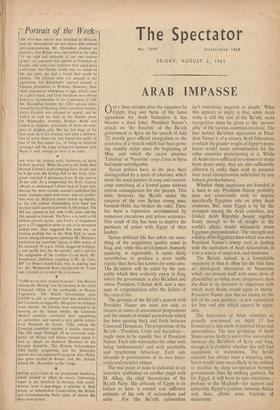ARAB IMPASSE
ONLY three months after the signature by Egypt, Iraq and Syria of the latest agreement for Arab federation it has become a dead letter. President Nasser's attack on 'the Fascists' of the Ba'ath government in Syria (in his speech of July 22) merely gave official recognition to the existence of a breach which had been grow- ing steadily wider since the beginning of May, and which the recent abortive 'Unionist' or `Nasserite' coup d'etat in Syria had made unbridgeable.
Syrian politics have, in the past, been distinguished by a spirit of tolerance which made the usual pattern of coup and counter- coup something of a formal game without serious consequences for the players. This time, however, the Ba'ath under the auspices of the new Syrian strong man, General Hafiz, has broken the rules. There has been a repression accompanied by numerous executions and prison sentences. One result of this has been to deprive the partisans of union with Egypt of their leaders.
Syrian political life has taken on some- thing of the sanguinary quality usual in Iraq. and, while this development, humanly speaking, is regrettable, it seems likely nevertheless to produce a more stable regime than Syria has known for some time.
The Ba'athists will be aided by the sym- pathy which they evidently enjoy in Iraq, where the government is also Ba'athist and whose President, Colonel Arif, sent a mes- sage of congratulation after the failure of the coup d'etat.
The grounds of the Ba'ath's quarrel with President Nasser are none too eask to discern in terms of announced programmes and the stream of mutual accusations which has been passing back and forth between Cairo and Damascus. The programme of the Ba'ath—'Freedom, Unity and Socialism'— might seem to be equally that of President Nasser. Each side reproaches the other with being 'undemocratic' and with unreliable and treacherous behaviour. Each side abounds in protestations of its own demo- cratic and socialist virtues.
The real point at issue is indicated in an interview (published on another page) with M. Aflaq, the chief theoretician of the Ba'ath Party. His criticism of Egypt is its failure to have 'a correct and sufficient estimate of the role of nationalism and unity. ... For [the Ba'athl nationalism isn't something negative or simple.' What this appears to imply is that, while Arab unity is still the aim of the Ba'ath, more recognition must be given to the 'person- ality' of the various countries involved. The fear behind Ba'athist opposition to Presi- dent Nasser is of a unitary Arab federation, in which the greater weight of Egypt's popu- lation would mean subordination for the other countries participating in it. While all Arabs have sufficient in common to make them desire unity, they are also sufficiently different to make them wish to preserve their local idiosyncrasies unlevelled by any federal gleichschaltung.
Whether these suspicions are founded it is hard to say. President Nasser probably does not consciously wish to impose specifically Egyptian rule on other Arab countries. But, since Egypt is by far the strongest among the Arab countries, any United Arab Republic bound together firmly enough to be of weight in the world's affairs would necessarily mean Egyptian preponderance. The strength and solidity of his Egyptian base which was once President Nasser's trump card in dealing with the aspiration of Arab nationalism, is now a source of suspicion, and weakness.
The Ba'ath, indeed, is a formidable opponent in that it offers for the first time an ideological alternative to Nasserism which can present itself with some show of plausibility as being more progressive than the Rais in its devotion to objectives with which most Arabs would agree in theory. President Nasser now has an enemy on the left of his own position—a new experience for him and one which cannot be agree- able.
The federation of Arab countries so proudly announced on April 17 has foundered in this clash of opposed ideas and personalities. The new groupings of Arab States seems likely to seea close association between the Ba'athists of Syria and Iraq, though it is doubtful whether this will find expression in institutions. The fertile crescent has always been a tempting idea, but it would seem more likely to be realised in practice by closc co-operation between governments than by striking gestures. As for Egypt, it will have to turn elsewhere— perhaps to the Maghreb—for support and sympathy. Egypt's position, between Africa and Asia, allows some freedom of manoeuvre.






























 Previous page
Previous page